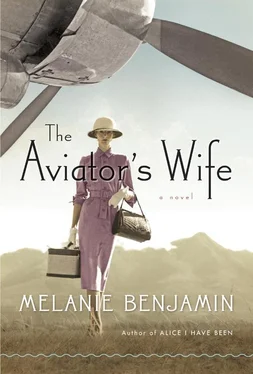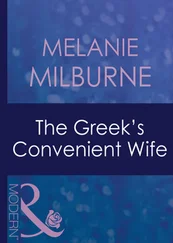This time, I was in charge, and I loved it. I loved every minute of it—the running up and down stairs with the tireless apartment agent, the nights spent going over brochures, the excitement of putting a bid in and having it accepted; a two-bedroom apartment with a dollhouse kitchen on the Upper West Side, just a block away from Central Park. Then the decorating—the picking out of curtains, wallpaper, furniture—this last, in Charles’s opinion, a luxury since we had more than enough surplus furniture in Connecticut. Why didn’t I just take some?
Why, indeed? Because I wanted a fresh start. I didn’t tell him that, however; I explained that with the cost of shipping it wouldn’t be that much less than buying new. Then I assured him I was keeping track of every expense in my accounting book. That seemed to mollify him.
Soon all was ready, and the first person I wanted to show it to was Charles. I felt, surprisingly, like a bride waiting to be carried over the threshold. It astonished me that still, after all that had happened, he was the first person I wanted to share everything with; good and bad. Somehow, a thing never seemed real until he saw it or experienced it, too—and then told me how to think about it.
But he didn’t come when I invited him. He had some Pan Am conference in Germany. He would visit soon, though, he promised. Meanwhile, would I remember to clean out the utility room, as the last time he was home he had noticed some old boxes of soap on a shelf in the corner?
No. No, I would not.
So I spent the first evening in my apartment alone, curled up on my new sofa nursing a solitary glass of wine as I gazed out over the city: the lights, the traffic, the bustle, the verve. All day I had felt queasy, a bit drowsy and thick as a terrible feeling crept over me; the feeling that I’d made a foolish, irreversible mistake. What right did I have, to strike out on my own at my age? What was I thinking? To live for oneself is a terrifying prospect; there is comfort in martyrdom, and for years, my hair shirt had been more comfortable than the silk brassiere I was currently wearing.
Then I heard voices outside my door, disappearing down the hall toward the elevator; the voices of people going out for the evening. All of a sudden I couldn’t— wouldn’t —sit there feeling sorry for myself. So I picked up the phone and—knowing full well what would transpire next—I called Dana.
He came over, and we sat in the growing shadows of evening, neither one of us turning on the lamp; content to have the lights from the city illuminate us as we bent our heads together, for the first time finding ourselves without words, only glances and touches.
Did I feel guilt? Shame? Regret?
Of course I did. I was married; he was married. We both had children that we vowed never to hurt; I couldn’t even bear to have pictures of mine in my apartment, after that night.
Oh, but I was ready . After a lifetime of being with a man who did not want to hear me speak unless I was mimicking his own views or assuring him he was right, I was ready. More than that, I was desperate to share the parts of me that Charles never wanted to know were there. The weak parts: that was how he viewed them and it took me a very long time not to view sympathy, grief, doubt, the ability to be moved to tears by love and happiness and sadness and music—as weak, despicable traits.
Dana taught me that the ability to grieve deeply also meant that a person had the capacity to love deeply, laugh deeply, live deeply—and that this was a capacity to be cherished. And that was, finally, why I loved him—because he never complained when I had a headache or changed my mind about something. He never shut down when I revealed my fears, my worries. He never tried to make me feel less, weaker, than he was—because he shared his own emotions with me, as well.
This honesty—this total freedom; it was as if I’d been living in one of those oxygen-deprived chambers that Charles used to test in the war. Until finally, I passed out. And when I awoke, it was to flowers and music and warm brown eyes—and all the air, all the space in the world; not just what was visible in the sky. I believed then that I could never get enough of it.
We were discreet, and it helped that I’d made few adult friends since my marriage. It also helped that the children were far too absorbed in their own lives to imagine I had one of my own.
Dana and I began to gather around us a small circle of his trusted friends, those who understood the nature of his marriage. Although most were astonished to discover the nature of mine . And I found, to my surprise and delight, that I was something of a literary star; I became a sought-after guest now suddenly available for dinner parties.
Of course, I knew my publisher was pleased with Gift from the Sea . It was continuing to go into extra printings, in both hardcover and paperback. I received lovely, warm letters from women all over the world. They wrote thanking me, asking me how I knew what they had been going through, assuring me that I was a friend for life.
Tucked away in Connecticut, I had not had a chance to taste the literary life—the life I had imagined back at Smith, when I had fancied myself, perhaps, a second Edna St. Vincent Millay or a member of the Algonquin Round Table. So it was with some disbelief, but mainly pure joy, that I found myself invited to speak at banquets and fund-raisers, or to give readings at libraries or wonderfully dusty little bookshops in the Village. I was asked not because I was Mrs. Charles Lindbergh, the aviator’s wife; I was asked because I was Anne Morrow Lindbergh, the latest literary sensation.
I rejoiced in every minute of it. And only occasionally did I wish that Charles was there to witness my triumph.
Dana rarely attended these events as my escort—I had other married male friends who were happy to step in—but he was always there as part of our circle of friends, and when the evening was over we’d all go back to my apartment, where Dana would sit in a special chair near the fireplace, and I would sit in my special chair opposite, and we all would talk and laugh and play games through the night. My intellect, my wit—I’d forgotten I’d even possessed them, and they were dull and neglected, to be sure. But in the company of others who prized thought over action, laughter over brooding, they blossomed and sharpened. My tongue fairly tripped with sparkling phrases, insightful comments. Once, I looked in a mirror in the middle of a game of charades; I was smiling that carefree grin, the one that used to look so unfamiliar in photographs. I laughed; finally, the face I presented to the public was the one I wore in private. Charles had done the same thing, only he had become a stone monument over time. I had become a real person. A happy person.
Sometimes, Dana would be the last of our friends to depart, and it would not be until after breakfast the next morning.
“You have no idea how beautiful you are,” he breathed into my ear the first time we made love. I was terrified and transported, both; to be touched by another man’s hands, not Charles’s? To be looked at, examined, all my flaws—my too-round breasts, heavy with age; my pouchy stomach, after six pregnancies; my thighs, though lean, now dimpled with cellulite. And my scars—but of course he knew those better than anyone, more intimately than Charles, even, and it was that moment, when he ran his forefinger gently, teasingly, along the scar from my gallbladder operation, so close, so dangerously close, to the most tender part of me—
That was the moment I was transported. I stopped comparing him to Charles physically, because he could never compare, and it wasn’t fair to him, or to me. I simply gave myself up to his loving, insistent examination of my entire body, and, frighteningly voracious, found myself unable to stop examining his. And it was the differences that excited me; different hands probing, different lips bruising, different sounds, different smells, different methods—
Читать дальше












